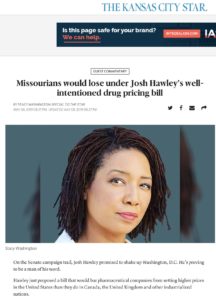
13 May 2019 Drug Price Controls Could Cost in Access to Life-Saving Medications
As the Trump Administration finalized a new regulation designed to lower prescription drug prices through the transparency of making costs known through advertising, two Republican senators also introduced legislation to cap domestic pricing at foreign levels.
It’s a proposal that Axios has called a “sharp left turn” for otherwise conservative senators and something “that could have been written by Bernie Sanders.”
Project 21 Co-Chairman Stacy Washington, in a Kansas City Star commentary, criticizes the idea:
That might sound like the sort of America-first policy we need to reduce health care costs. But it’s not. Though unquestionably well-intentioned, Hawley’s bill would likely backfire and deprive Americans of lifesaving medicines.
The “Transparent Drug Pricing Act of 2019,” sponsored by Senators Josh Hawley of Missouri and Rick Scott of Florida, would – like the Trump Administration’s rule – make the costs of drugs more readily available to patients and interested consumers. But it would also prohibit the pharmaceutical industry from “charg[ing] American consumers more for prescription drugs than they charge consumers in other industrialized nations like Great Britain, Canada or Germany.”
Stacy warns that Americans who now enjoy top-rate, high-quality health care have “too much to lose” in embracing prescription drug price controls.
In her commentary, Stacy explains the reason why drugs can sometimes cost so much in America compared to other countries (a “benefit” that comes at a cost):
But there’s a reason for this price disparity. Many other countries set strict caps on drug prices. For instance, Canada’s Patented Medicine Prices Review Board has the power to force drug companies to lower prices. The United Kingdom simply refuses to cover drugs that bureaucrats deem too expensive.
Such restrictions make drug companies unable or unwilling to sell their products in many foreign countries. Americans have access to 95% of cancer drugs released worldwide between 2011 and 2018. But Canadian patients have access to just 58% of those medicines. Patients in the United Kingdom have access to just 74%…
Ultimately, Hawley’s bill would just bring foreign price controls stateside. That’s bad news for drug companies, which already face massive barriers to success. Bringing a new drug to patients is expensive, time-consuming and risky. Only 12% of experimental treatments ever make it to market. All told, it costs approximately $2.6 billion and takes up to 15 years to create a single drug, according to the Tufts Center for the Study of Drug Development.
Drug companies spend a lot of money to develop new and innovative medications, and they need to recoup their spending on these and failed drugs through market pricing. This is allowed in the United States, but other countries sometimes demand and impose the lower prices. This may cost those countries in terms of the timeframe for the drugs becoming available or their availability altogether. The inability to make back its investment may well keep the pharmaceutical industry from being able to move forward on the research and development of new and improved drugs.
Stacy adds:
America has led the world in drug development for decades. Since the turn of the century, the U.S. pharmaceutical industry has invested more than half a trillion dollars developing new drugs. More than half of the world’s new cures come from U.S. labs…
Hawley’s bill would stop these advancements dead in their tracks. Price controls would deter research and development investments. Today’s incurable diseases might remain incurable forever.
To read all of Stacy’s commentary – “Missourians Would Lose Under Josh Hawley’s Well-Intentioned Drug Pricing Bill” – in the Kansas City Star, click here.




